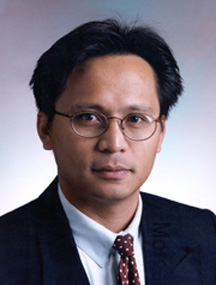Moe Z. Win
- Associated organizations
- MIT
- Fields of study
- Communications, Computing
- Awards
- MIT School of Engineering Educational Innovation Award, U.S. Presidential Early Career Award for Scientists and Engineers
Biography
Robert A. Scholtz and Moe Z. Win worked together to pioneer ultra-wide bandwidth (UWB) impulse technology, a form of radio communications that has strongly influenced the direction of wireless communications, both in academia and industry, and enabled economical wireless access without licensing restrictions.
Dr. Scholtz and Dr. Win first collaborated in the early 1990s at the University of Southern California (USC) on landmark studies that provided the theoretical basis for the design of UWB wireless networks. Scholtz, then a professor, published the first analysis of the potential of UWB communications. Win, then a doctoral student working with Scholtz, performed the first UWB signal propagation experiments leading to the efficient design and performance analysis of UWB transmission systems.
They were the first to demonstrate the superiority of UWB in multipath environments, including resistance to jamming and fading, immunity to interference, and reduced power requirements. The two researchers created the UltRa Laboratory at USC, the first university UWB radio research program. It provided the foundation for using UWB technology in the design of reliable wireless networks.
Scholtz’s and Win’s work was a precursor of an extensive study by the U.S. Federal Communications Commission, which ultimately authorized commercial use of UWB technology for many new applications, including broadband Internet access, high-speed multimedia data transfer, sensor networks, medical imaging, and ground-penetrating radar. They also developed a unique wireless methodology for the U.S. Department of Defense that enables robust communication connectivity in harsh environments.
Dr. Win’s work on impairment mitigation techniques for wireless and optical channels has impacted current and emerging communications technologies. He developed hybrid diversity techniques for wireless systems, which reduce complexity and energy consumption compared to conventional diversity techniques. This work has contributed to reliable wireless access, enabling practical spatial and temporal diversity solutions such as subset combing multiple antennas and Rake receivers. Dr. Win has also developed signal-processing techniques to mitigate dispersion and nonlinearities in optical fibers, contributing to reliable transmission over longer distances and at higher data rates.
An associate professor at the Laboratory for Information and Decision Systems at the Massachusetts Institute of Technology in Cambridge, Dr. Win is an internationally acclaimed authority on UWB wireless networks and has organized and chaired many conferences on UWB communications. An IEEE Fellow and IEEE Distinguished Lecturer, he currently chairs ComSoc’s Radio Communications Committee and has been editor of Wideband Wireless and Diversity and an area editor for Modulation and Signal Design, both for the IEEE Transactions on Communications.
Dr. Win has received the MIT School of Engineering Educational Innovation Award, the U.S. Presidential Early Career Award for Scientists and Engineers, a Fulbright Fellowship, and the International Telecommunications Innovation Award from the Korea Electronics Technology Institute. He holds a bachelor’s degree in electrical engineering from Texas A&M University in College Station, a master’s degree in applied mathematics and a doctoral degree in electrical engineering, both from USC.
